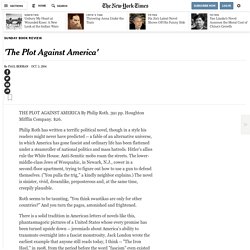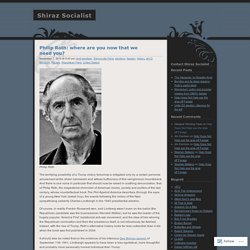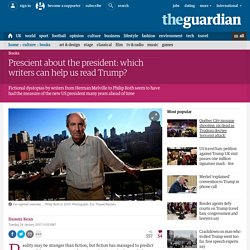

Sinister, vivid, dreamlike, preposterous, creepily plausible. Fascism took over most of continental Europe during those years, and this event was terrifying not just for the obvious reasons but also because every country in Europe seemed to have generated a fascist movement of its own, drawing on national idiosyncrasies and charming folk costumes -- such that, after a while, the very existence of local traditions and funny hats came to seem positively sinister.

In America, European-style fascist movements, the imitators of Hitler and Mussolini, were already marching around the streets. Roth describes the German-American Bund of Union, N.J., drinking from beer steins and enjoying the accordion music of "a stout little man in short pants and high socks who wore a hat ornamented with a long feather. " The Republicans at the actual convention that year nominated a lawyer named Wendell Willkie to run against Franklin Roosevelt, which was pretty much a doomed thing to do.
Roth's narrator recalls a different outcome. " 'No! ' " 'Under F.D.R.? ' How Philip Roth Predicted the Rise of Donald Trump. A candidate galvanizes a weakened and divided Republican Party.

He’s a celebrity, a charismatic outsider with no political experience, and his racist rhetoric does nothing to halt his momentum. As Philip Roth wrote, “Fear presides over these memories, a perpetual fear.” Am I the only one who — just a week ago — pulled Roth’s 2004 alternative-history novel, “The Plot Against America,” off my bookshelf and found myself reading about Donald Trump? Alternative histories are often classified as science fiction, and to many of us, Trump’s nomination feels as though it must have taken place on another planet, or perhaps we wish it were, in fact, alternative history, and, like Mr.
Tagomi in Philip K. Roth’s novel begins in 1940 when the famous transcontinental aviator Charles Lindbergh flies into a brokered Republican convention and becomes the nominee. Donald Trump, like Lindbergh, arrives at his position as an established personality rather than as a politician. Where are you now that we need you? Philip Roth The terrifying possibility of a Trump victory tomorrow is mitigated only by a certain perverse amusement at the sheer narcissism and witless buffoonery of this vainglorious mountebank.

And there is one voice in particular that should now be raised in scathing denunciation: that of Philip Roth, the magesterial chronicler of American mores, society and politics of the last century, whose counterfactual book The Plot Against America describes (through the eyes of a young New York Jewish boy), the events following the victory of the Nazi sympathising celebrity Charles Lindbergh in the 1940 presidential election.
Of course, in reality Frankin Roosevelt won, and Lindberg wasn’t even on the ballot (the Republican candidate was the businessman Wendell Willkie), but he was the leader of the hugely popular ‘America First’ isolationist anti-war movement, and the idea of him winning the Republican nomination and then the presidency itself, is not ridiculously far-fetched. Like this: Prescient about the president: which writers can help us read Trump? Reality may be stranger than fiction, but fiction has managed to predict some of the strangest turns of our “post-fact” age.

In the week that Donald Trump was inaugurated as the president of the US, Sinclair Lewis’s It Can’t Happen Here was republished – the plot of which resonates with the rise of Trump. With eerie prescience, Lewis told the story of Buzz Windrip – demagogue, chancer and political conman of the highest order – who travels from the margins of politics to be swept to power by popular vote. But though Lewis’s main character bears the most obvious resemblance to Trump, his novel is not the only dystopian fiction to predict the awkward political realities of 2017. Philip K Dick’s The Man in the High Castle imagines an alternative America in which Germany won the second world war – a cautionary tale about the dangers of complacency in the face of fascism that also feels uncomfortably relevant. EM Forster’s short story The Machine Stops is a case in point.
Philip Roth E-Mails on Trump.